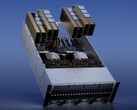Nvidia's RTX 5090 is its most powerful consumer-grade GPU to date and one that is notoriously hard to find at MSRP in various countries around the world, when available.
For users in China however, export restrictions have forced GPU giant Nvidia to cut its ultimate GPU offering multiple times in recent years to offer a compliant solution for the domestic market.
This is due to the large addressable market in play in China even as concerns mount in the US about Chinese AI researchers using Nvidia's latest and greatest consumer GPU in droves to pull ahead in the race for Artificial General Intelligence (AGI).
This has resulted in China-specific GPUs that match said restrictions to be made by Nvidia since the last generation that are both, compliant with existing restrictions while also allowing its domestic consumer GPU market to be dominated by Team Green.
Nvidia is reportedly considering launching the RTX 5090DD, the successor to its RTX 5090D GPU that currently serves the Chinese market in a bid to meet tightening maximum performance tiers in terms of hardware requirements for any GPU sold in the territory.
It is important to note that Nvidia has already released a cut-down version of last generation's Ada Lovelace flagship, the RTX 4090 in the form of a China-exclusive RTX 4090D as well as an earlier installment of the current generation RTX 5090 (as the RTX 5090D).
The difference however has been that while the RTX 4090D offered a lower core count and TDP versus the RTX 4090, the RTX 5090D and the rumored RTX 5090DD offer the same amount of CUDA cores (21760) and (575W) TDP as a full-fledged RTX 5090.
There is an important distinction however: while the RTX 5090D offers the full speed and memory capacity of the RTX 5090 with limited AI TOPs, the RTX 5090DD allegedly cuts that down to 24GB of GDDR7 memory at a reduced 384-bit bus bandwidth versus the 512-bit offering of Nvidia's flagship.
While the Nvidia RTX 5090DD has yet to be formally launched, it does seem to have a tentative release date of August 2025 as per Taiwanese website Benchlife.
















